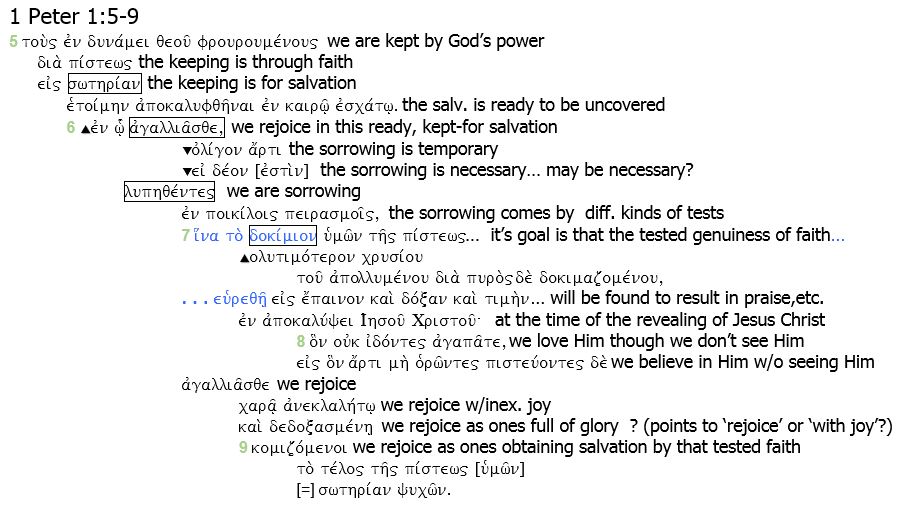Keep Going - 1 Peter 1:5-9
 This outline continues a series preached in 2002. For the curious, these outlines don’t look much like what I actually took to the pulpit. Those notes were color coded and heavily abbreviated, usually fitting on roughly one side of a single letter-sized sheet of paper. I often found that my desire to communicate with the people in the room made it difficult to actually read complex sentences. If I was going to speak extemporaneously, the notes had to be of the sort I could take in with quick glances. Of course, if you preach the text, you always have most of your structure and content right there.
This outline continues a series preached in 2002. For the curious, these outlines don’t look much like what I actually took to the pulpit. Those notes were color coded and heavily abbreviated, usually fitting on roughly one side of a single letter-sized sheet of paper. I often found that my desire to communicate with the people in the room made it difficult to actually read complex sentences. If I was going to speak extemporaneously, the notes had to be of the sort I could take in with quick glances. Of course, if you preach the text, you always have most of your structure and content right there.
Keep Going
Intro (1 Pet.1:5-9)
who are kept by the power of God through faith for salvation ready to be revealed in the last time. 6 In this you greatly rejoice, though now for a little while, if need be, you have been grieved by various trials, 7 that the genuineness of your faith, being much more precious than gold that perishes, though it is tested by fire, may be found to praise, honor, and glory at the revelation of Jesus Christ, 8 whom having not seen you love. Though now you do not see Him, yet believing, you rejoice with joy inexpressible and full of glory, 9 receiving the end of your faith—the salvation of your souls. (NKJV, 1 Peter 1:5–9)
Like most people, I’ve never much liked going to dentists. On one occasion I had a particularly bad cavity. In addition to the usual work in that situation, an old filling had to come out, too. That meant lots of drilling. Before we were half way through, I just wanted to call the whole thing off. “See ya!”
Some truths came to mind that kept me in the chair: “This will hurt more if it isn’t fixed.” Then there was, “The worst is over. It’s all better from here,” and of course, the old standby, “It’ll be over soon.”
Similarly, some portions of Scripture are given to us mainly to keep us going when things get painful. 1 Peter 1:5-9 is one of them. We know believers’ struggle with suffering is the context, because of the last part of verse 6: “you have been grieved by various trials.”
Review
In this study, we’ve seen that we are strangers—displaced, beloved and born again. Peter now transitions to life as we know it, connecting who we are to what we experience.
One of the things we experience a lot of is pain and trouble. This passage points out four reasons we can be joyful in hard times.
1. We can be joyful in hard times because our future is certain through faith v.5-6a
“Who are kept by the power of God through faith for salvation ready to be revealed in the last time. 6 In this you greatly rejoice”
This is about our faith in God’s promises, in particular the promise that He saves those who put their trust in Christ.
- Our future is certain because it’s God empowered: “Kept by the power of God”
- Our future is certain because our salvation is ready: “Ready to be revealed”
- Our certain future helps us live joyfully now: v.6 “In this you greatly rejoice”
Our family used to travel by minivan to the Michigan Upper Peninsula pretty often to visit with my mom and dad when they lived there. One Christmas, the drive was especially exhausting. We’d already been on the road a good ten hours or more. It started snowing a few hours from our destination. The sun went down; the snow got very heavy; visibility was poor and the road was very slippery. Pretty soon we were not having fun at all. When you’re driving in that, you get very, very focused—it’s just you, the conditions, the steering wheel, one slow second at a time. One phrase kept seemingly repeating itself in my mind: “Not far now … not far now. Just keep going.”
2. We can rejoice in times of trouble because our struggles will glorify God through faith v.6-7
now for a little while, if need be, you have been grieved by various trials, 7 that the genuineness of your faith, being much more precious than gold that perishes, though it is tested by fire, may be found to praise, honor, and glory at the revelation of Jesus Christ
Note what’s happening: a variety of tests causes grief and sorrow (v.6).
Note why it’s happening: so the genuineness of our faith will result in “praise, honor and glory” at the appearing (v.7).
Let’s be honest. The glory of God can seem awfully abstract and vague to us in our daily lives. It can seem far away, not all that relevant. “I’m just trying to pay the rent and keep food on the table … I’m just trying to keep getting out of bed and making it to work through this illness … I’m just trying to hold my family together and avoid a divorce … I’m just trying to figure out what life is now that my spouse has died.” I don’t know what your struggle is. Fill in the blank.
When the journey becomes very difficult, we get focused on the most basic tasks connected with the most pressing problems.
But that’s why this passage is here. To call heart and soul to a larger reality. We’re called to keep going, yes, but to keep going joyfully and with a particular goal in mind: our contribution to the greatest thing in the universe—the glory of God.
So v. 7 refers to the “genuineness of your faith.” We’re not just humans who have to persevere in trouble. We’re believers who are called to persevere in faith during trouble.
3. We can rejoice in troubled times because Christ is real to us through faith v.8a
Through faith, Jesus is real to us (“having not seen, you love. Though now you do not see … ” v.8).
The challenge: we don’t see
Peter acknowledges the difficulty we face: we have never seen Christ and do not now see Him. But the apostle insists that despite that challenge we love Him and rejoice in Him anyway. In this respect, faith is not entirely unlike imagination.
The solution: faith and imagination
Imagination is not just an ability to conceive of what isn’t real. It’s also the ability to conceive of what is entirely real but not observable.
We use imagination (and a kind of faith) every time we make a journey to a place we haven’t been. We picture the route in our minds and figure out what steps we’ll have to take. We use imagination—a kind of faith—whenever we plan, design, or make something. We use imagination whenever we feel pain in response to someone else’s suffering.
And we do it on purpose. We can also exercise faith in the reality of our risen Savior, and rejoice in that reality though not seeing.
4. We can rejoice in troubled times because we are already changing through faith.
We are already experiencing the transforming outcome of our faith (“You rejoice … receiving the end of your faith—the salvation of your souls”). Both “rejoice” and “receiving” are in the present tense. We have already been saved from sin’s penalty, we are being saved from its power and we will be saved from its presence.
Conclusion
Life gets hard sometimes, no doubt about it. When it does, we must turn our hearts and minds back to the encouraging realities of life in Christ.
Aaron Blumer Bio
Aaron Blumer, SharperIron’s second publisher, is a Michigan native and graduate of Bob Jones University (Greenville, SC) and Central Baptist Theological Seminary (Plymouth, MN). He and his family live in a small town in western Wisconsin, not far from where he pastored Grace Baptist Church for thirteen years. He is employed in customer service for UnitedHealth Group and teaches high school rhetoric (and sometimes logic and government) at Baldwin Christian School.
- 1457 views



Discussion